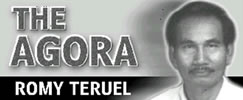VOLUME XXVIII No. 32 |
Tagbilaran City, Bohol, Philippines |
February 16, 2014 issue |
advertisement |
| - |
| - |
ARCHIVED ISSUES |
 |
 |
Towards a Non-killing Filipino Society |
|
Is it possible? Nonkilling is not even a word one will find in the Oxford English dictionary or in any other dictionary for that matter. Try using it in your computer and the word will be underlined red every time. But the 17 “founding fathers” (I call them founding fathers for being the first to put this advocacy in a book with the same title) are positive that it is possible. And by sheer luck (how else will one call it when after only one session where the idea was first introduced), the Sangguniang Panlalawigan passed resolution declaring February 11, 2014 as Provincial Peace Day in the Province of Bohol to be commemorated with fitting ceremonies by all who advocate genuine and lasting peace under a nonkilling society. True enough the Boholano version of the Movement for a Nonkilling Philippines (MNKP) was launched in Bohol during the celebration of the Provincial Peace Day last Tuesday at the Pres. Carlos P. Garcia Park in Tagbilaran City. It was also the commemoration of the declaration of the Province of Bohol as insurgency-free province by then Defense Secretary Norberto Gonzales on February 11, 2010. Led by the former President of the University of the Philippines, Professor Emeritus Jose V. Abueva, the “founding fathers” believe that a nonkilling Filipino society is possible. It may be problematic but it is not unthinkable. While another “founding father,” Natalia M.L.M. Morales says a nonkilling society is definitely possible in the Philippines. So that our readers can form their own opinion about the subject that the provincial government of Bohol through the Sangguniang Panlalawigan is already sold out to, it is important to know how the “founding fathers” define a nonkilling society. Dr. Glenn Paige, who is based in Hawaii, defines nonkilling society as “a human community, smallest to largest, local to global, characterized by no killing of humans and no threats to kill, no weapons designed to kill humans and no justifications for using them; and no conditions of society dependent upon threat or use of killing force for maintenance or change.” According to Professor Abueva, Dr. Paige is a multi-awarded scholar who has gained international recognition and respect for his scholarly work and passionate interest in the scientific study of political leadership and global nonviolence. One of these awards is the Distinguished Career Award for demonstrated excellence in teaching and scholarship in the service of transformational politics given by the American Political Science Association in 2004. Among his books is Nonkilling Global Political Science published in 2002. So is a nonkilling society possible? Responses to this question by political scientists across the globe have been varied. In America the basis for negative responses is based upon three notions, 1) it is in the human nature to kill. Human beings have always killed and will continue to do so; 2) economic scarcity will always lead to competition, conflict and killing forever; and 3) sexual assault where males must always be prepared to kill to defend their female relations against rape. In contrast a positive response from a leading political philosopher and party leader, Professor Hwang Jang Yop of Korea says that:1) human beings are not animals because they are endowed with consciousness, reason and creativity that enable them to liberate themselves from killing; 2) scarcity of natural resources can be overcome by productivity, creativity and equitable distribution; and 3) rape can be overcome by education and provision of proper social atmosphere. Nonkilling advocates argue that it is not in the nature of human beings to kill. “Most human beings who have lived have never directly killed anyone. If human beings were innate killers, the human family could not exist. In the Philippines alone this is backed up by statistics. WHO report says that the Philippines in 1993 had only 7,726 homicides or 14.2 per 100,000 persons in a population of 75.6 million. Suicide was only 851 or 1.5 per 100,000 people. In other words while human beings are capable of killing, they are not compelled to kill. Prof. Abueva says that this generalization applies to Filipinos. If majority of Filipinos killed or were prone to kill, our populations would not have ballooned in the last half century to become the 14th most populous country in the world today. There are still so many reasons to say that a nonkilling Philippines and particularly a nonkilling Boholano society is possible. We will endeavour to bring these up in our future columns. In the meantime what do you have to say about a nonkilling Boholano society? Sign up and join the MNKP! |
| - |
| - |
The Bohol Sunday Post, copyright 2006 - 2014, All Rights Reserved |
For comments & sugestions please email: webmaster@discoverbohol.com |



